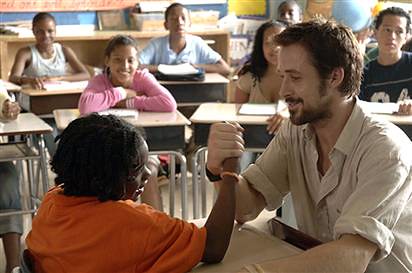In 2004, Berkeley-born Ryan Fleck won awards at the Aspen Shortfest, the Boston Independent Film Festival & the Sundance Film Festival for a short film entitled Gowanus,
I sort of avoided this movie when it first came out to rave reviews last year. Being an indie made that easy as us ex-urbanite
So I was surprised to discover that neither of the predictable end results is what happens here, surprised and frankly pleased. In large part, this is because this film intersects with the story already in progress & leaves it well before it reaches either of those logical conclusions. It can do this because it’s not about that story, but rather about the relationship between the two key characters, a charismatic, committed, very likeable history teacher who can’t get away from freebasing crack, and a troubled 13-year-old student who catches him blasted one day in the locker room &, for reasons that have everything to do with her history, decides not to tell anyone.
An awful lot of this film really is about nothing other than the complexity of these two individuals, only tiny portions of which come out in dialog. There are scenes early on, such as when Gosling’s Dan Dunne sees his ex-girlfriend, through rehab & engaged to be married, before she sees him, where the viewer can recognize, just in Gosling’s body language and facial expression, the degree to which the character struggles with his fight-or-flight response. There are several moments when Epps’ Drey glares her way through a scene – Epps is easily the most intense “child actor” I’ve ever seen on screen. She doesn’t need language to articulate the anger she feels at the loss of her brother, who is in prison, or the devastation she senses as a latch-key kid to an emergency medical technician single parent. When the local crack dealer, intelligently played by Anthony Mackie, attempts to recruit her to handle the final exchange of product for cash – she’s the one taking the risk of being busted for dealing – her diffidence & hesitancies as she tests out this path says an enormous amount about her tentative sense of self & self-worth.
Much of this film is about emotional clumsiness. By refusing to adhere to the school’s approved curriculum – he’s showing his students videos of Mario Savio, the Attica massacre, the murder of Harvey Milk, the U.S. role in the coup in Chile, trying to teach dialectics to middle-school kids – the teacher is practically screaming to be fired. Both of the film’s two sex scenes – one of them an attempted rape – are about vulnerability, not eros. When the teacher shows up at school with a stitch on his lip, he covers it with an American flag Band-Aid. A meal at home with his parents is excruciating – the only person he can talk to is his brother’s new girlfriend, whom he’s never met before. When, after the dope dealer has warned Drey to stay clear of the “basehead” teacher, the two older men in her life confront one another, the result is not Fort Apache, Brooklyn, but almost in the manner of two uncles attempting to watch out for the orphan niece. Even the film’s climactic & concluding scenes are all about clumsiness, vulnerability &, at least on one level, acceptance. This film is a choreographer’s dream of emotional missteps, which is what I think Kevin Smith was responding to with his (somewhat overly) generous assessment.
I’ve had the opportunity, if that’s the right word, to see what freebasing can do to a professional, even a single a parent, and I know that the spiral that this teacher is in can – and almost inevitably will – get a whole lot worse, far, far uglier. It would have been easy to have made that movie, it’s one we’ve seen a dozen times, but the result wouldn’t have been one-tenth as solid as Half Nelson.
¹ Gosling was part of the Mickey Mouse Club cast during the fabled 1993-94 period, the end of that show’s third incarnation, that also included Christina Aguilera, Britney Spears & Justin Timberlake. Gosling, a Canadian, lived with Timberlake’s family during filming. While the other three got into bubblegum music, Gosling stuck to acting & subsequently has been in a lot of the dog movies & TV series aimed at teens, such as Young Hercules, but in the process has become a tremendously subtle actor. It’s like watching the next Johnny Depp emerge, tho Gosling lacks Depp’s phenomenally feminine good looks.






